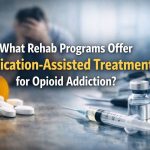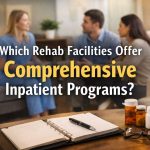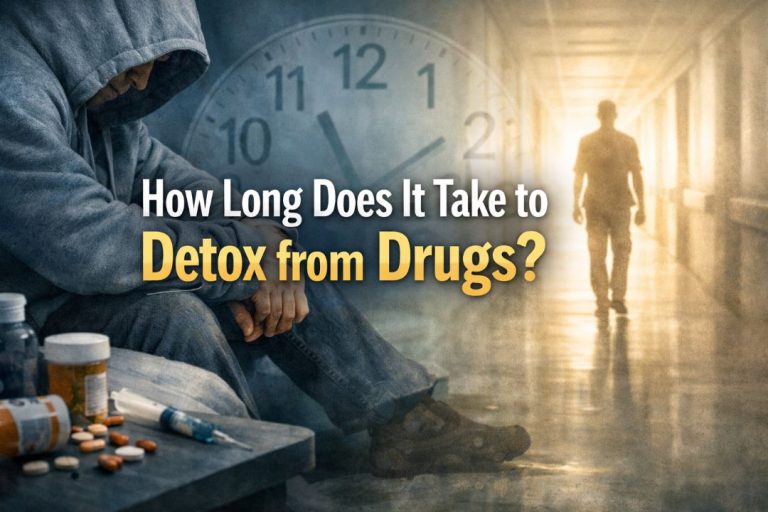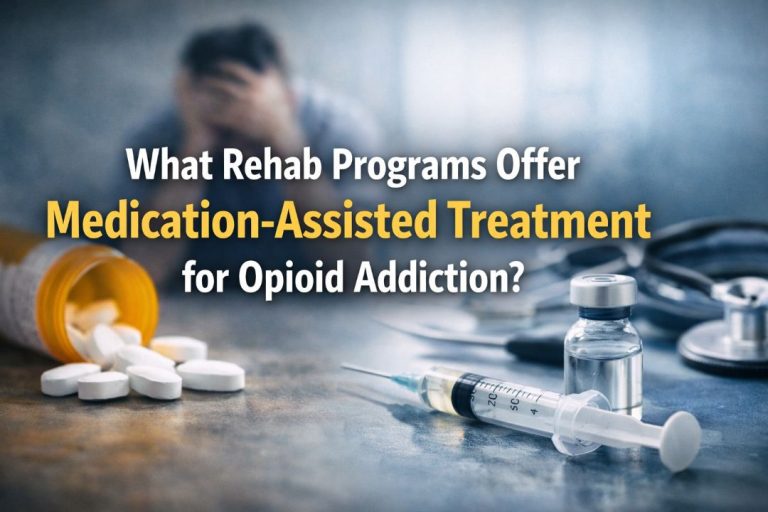Millions of people in the United States live with substance use disorder (SUD). Substance abuse and addiction can have serious, sometimes life-threatening effects.
However, many people do not seek treatment to overcome substance abuse or addiction. For some, the fear of losing their job is a barrier between them and the treatment they need.
There are federal laws protecting your employment if you seek addiction treatment. People may go to rehab without fear of losing their job. The Family Medical Leave Act (FMLA) is one of these laws.
This article will explore how the FMLA protects employment during rehab. You will learn:
- What the FMLA is
- How to use FMLA to go to rehab
- Other laws protecting your employment during rehab
- How to determine if you need SUD treatment
- Where to find comprehensive addiction treatment and recovery support
If you or a loved one struggles with substance abuse or addiction, you are not alone. Solutions Healthcare offers comprehensive treatment and compassionate support for people with substance use disorder.
Contact our intake specialists to learn more about using FMLA to go to rehab or to explore your treatment options. Reach out to schedule an intake appointment or to ask questions about treatment.
What is the Family Medical Leave Act (FMLA)?
The Family Medical Leave Act (FMLA) is a federal law. It provides job protection for eligible employees who require a leave of absence to seek treatment for a health issue. FMLA also allows family members to take a leave to care for a spouse, child, or parent requiring medical care.
Since 1993, the Family Medical Leave Act has provided protection for people with SUD who need to take a leave of absence for rehab. To use FMLA to attend treatment, employees must meet specific criteria, including:
- They must have worked for the company for 12 consecutive months
- They must have completed a minimum of 1,250 hours of work within those 12 months
- The company must have at least 50 employees within 75 miles of a central location
According to the Department of Labor, the FMLA allows employees working for a covered employer to take up to 12 weeks of unpaid leave to seek treatment for a medical or mental health condition.
Upon return to work, the employee must continue to receive health insurance and be placed in the same or an equal position. They may not receive a pay cut or significant changes to the schedule that affect compensation.
Contact the Solutions Healthcare specialists to learn more about the Family Medical Leave Act (FMLA) or to explore our treatment programs.
How Can I Use FMLA For Addiction Treatment?
You may follow these steps if you require a leave from work to attend rehab under FMLA.
1. Get a substance abuse evaluation
Your employer may require you to receive a formal diagnosis of substance use disorder (SUD) before taking a leave of absence. You may be required to undergo a substance abuse evaluation.
You may obtain a substance abuse evaluation from a doctor, mental health professional, or addiction specialist at Solutions Healthcare. Contact us to learn more or schedule an assessment.
2. Speak with your HR representative
Talk to your human resources (HR) representative about your intentions to take a leave of absence. Your HR representative will guide you through the process of applying for a leave under FMLA, if you are eligible.
3. Communicate with your employer
Communicate with your employer about start and end dates, as well as your plan to return to work. Tell your employer as soon as possible if your schedule or plans change. You should not work during your leave of absence. Instead, focus your time and energy on your recovery.
You may be eligible to adjust your work schedule when you return to work. Talk to your HR representative about accommodations you may require as you transition back into your role after rehab.
Several other laws protect your privacy during treatment and employment during recovery. These include:
- The Americans with Disabilities Act (ADA)
- Health Insurance Portability and Accountability Act (HIPAA)
Your employer may also offer additional resources or support, such as employee assistance programs (EAP), to help you transition back to work smoothly.
Contact the Solutions Healthcare specialists to learn more about the laws protecting your employment during rehab. Reach out with questions or to explore your treatment options.
100% Confidential Support is Available 24/7
No matter what you’re going through, you’re not alone. Our dedicated team is here to provide a safe, judgment-free space where you can talk openly and honestly. Whether you need emotional support, resources, or just someone to listen.
We’re here for you—completely confidential and always respectful of your privacy. Call us today!
Do I Need Addiction Treatment?
Most people living with SUD are employed. Substance abuse and addiction can affect your work performance, relationships, physical health, and emotional well-being. These complex conditions can quickly become life-threatening.
It can sometimes be challenging to recognize the signs of substance use disorder in yourself or a loved one. However, knowing the signs of SUD can help you seek treatment to overcome it.
Common signs of substance abuse and addiction include:
- Changes in behaviors, mood, sleep, or appetite
- Dishonest or sneaky behaviors
- Using more drugs or alcohol over time
- Spending a lot of time and energy getting, using, and recovering from drugs or alcohol
- Doing risky things while using drugs or alcohol, like driving or having unprotected sex
- Needing to use more of a substance to get the desired effects
- Having cravings for drugs or alcohol
- Wanting to cut back or stop, but struggling to control your substance use
- Continuing to use drugs or alcohol even when it causes significant harm
People who become addicted to drugs or alcohol typically cannot choose to stop whenever they want to. Most people require intensive treatment and continuing support to quit.
Contact Solutions Healthcare
Battling with Drug and Alcohol Addition? Remember, you are not alone and we are here to help you!
Find Help Now
Contact the Solutions Healthcare team to learn more about addiction, recovery, and available treatment programs. Take the first step of your recovery journey by scheduling an intake appointment today.
References
- U.S. Department of Labor: Family and Medical Leave (FMLA)
- U.S. Office of Human Resources Management: FMLA – Serious Health Condition






















